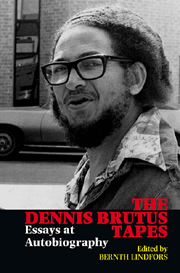On Literature & Commitment
from POETRY
Published online by Cambridge University Press: 05 April 2013
Summary
[At a symposium on Contemporary Black South African Literature held at The University of Texas at Austin in March 1975, there was a panel on “Literature and Commitment” involving Keorapetse Kgositsile and Dennis Brutus as featured speakers and Chinua Achebe (representing West Africa) and Ali Mazrui (representing East Africa) as respondents. After Kgositsile had spoken, Brutus made the statement that follows.]
I want to examine the essence of commitment and, continuing in the vein of Willy Kgositsile, reiterate one of the points he made. Before doing that, however, I propose to make some prefatory comments, look at certain aspects of commitment as expressed in the writing of blacks in South Africa, examine the relation between those writers who are involved in protest and the others who are part of the system, and conclude with some general observations which I think have useful lessons for our audience and particularly for critics in the field of African literature. (I do not propose to get involved in the debate this morning about my own work; I think I should abstain from that discussion.)
The essential point to recognize, and one Kgositsile has made, is that there is no uncommitted writing. It has been said in America in much simpler and sloganistic terms: “If you are not part of the solution, you are part of the problem.” You have to decide which side you are on: there is always a side.
- Type
- Chapter
- Information
- The Dennis Brutus TapesEssays at Autobiography, pp. 180 - 186Publisher: Boydell & BrewerPrint publication year: 2011



